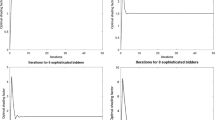Abstract
Experimental research on first price sealed bid auctions has usually involved repeated settings with information feedback on winning bids and payoffs after each auction round. Relative to the risk neutral Nash equilibrium, significantly higher bidding has been reported. The present paper reports the results of experimental first price auctions with n=7 where feedback on payoffs and winning bids is withheld. Under these conditions, average bidding is below the risk neutral Nash equilibrium prediction but converges to it with repetition.
Similar content being viewed by others
References
Armantier, O., & Treich, N. (2005). Overbidding in independent private-values auctions and misperception of probabilities. Université Montréal, mimeo.
Cason, T. N. (1995). An experimental investigation of the seller incentives in the EPA’s emission trading auction. American Economic Review, 85, 905–922.
Chen, K., & Plott, C. R. (1998). Nonlinear behavior in sealed-bid first-price auctions. Games and Economic Behavior, 25, 34–78.
Cox, J. C., Roberson, B., & Smith, V. L. (1982). Theory and behavior of single object auctions. In V. L. Smith (Ed.), Research in experimental economics (Vol. 2). Greenwich: Jai.
Cox, J. C., Smith, V. L., & Walker, J. M. (1987). Bidding behavior in first-price sealed-bid auctions: use of computerized nash competitors. Economics Letters, 23, 239–244.
Cox, J. C., Smith, V. L., & Walker, J. M. (1992). Theory and misbehavior of first-price auctions: comment. American Economic Review, 82, 1392–1412.
Dorsey, R. E., & Razzolini, L. (2003). Explaining overbidding in first price auctions using controlled lotteries. Experimental Economics, 6, 123–140.
Dufwenberg, M., & Gneezy, U. (2002). Information disclosure in auctions: an experiment. Journal of Economic Behavior and Organization, 48, 431–444.
Dyer, D., Kagel, J. H., & Levin, D. (1989). A comparison of naive and experienced bidders in common value offer auctions: a laboratory analysis. Rand Journal of Economics, 20, 268–279.
Engelbrecht-Wiggans, R., & Katok, E. (2005a). Regret and feedback information in first-price sealed-bid auctions. Penn State University, working paper.
Engelbrecht-Wiggans, R., & Katok, E. (2005b). Regret in auctions: theory and evidence. Penn State University, working paper.
Fischbacher, U. (in press). z-Tree – Zurich Toolbox for Readymade Economic Experiments. Experimental Economics.
Friedman, D. (1992). Theory and misbehavior of first-price auctions: comment. American Economic Review, 82, 1374–1378.
Goeree, J. K., Holt, C. A., & Palfrey, T. R. (2002). Quantal response equilibrium and overbidding in private value auctions. Journal of Economic Theory, 104, 247–272.
Harrison, G. W. (1989). Theory and misbehavior of first-price auctions. American Economic Review, 79, 749–762.
Harrison, G. W. (1992). Theory and misbehavior of first-price auctions: reply. American Economic Review, 82, 1426–1443.
Isaac, R. M., & Walker, J. M. (1985). Information and conspiracy in sealed-bid auctions. Journal of Economic Behavior and Organization, 6, 139–59.
Kagel, J. H. (1995). Auctions: a survey of experimental research. In J. H. Kagel & A. E. Roth (Eds.), Handbook of experimental economics. Princeton: Princeton University Press.
Kagel, J. H., Harstad, R., & Levin, D. (1987). Information impact and allocation rules in auctions with affiliated private values: a laboratory study. Econometrica, 55, 1275–1304.
Kagel, J. H., & Levin, D. (1993). Independent private value auctions: bidder behavior in first-, second-, and third-price auctions with varying numbers of bidders. Economic Journal, 103, 868–879.
Kagel, J. H., & Roth, A. E. (1992). Theory and misbehavior of first-price auctions: comment. American Economic Review, 82, 1379–1391.
Merlo, A., & Schotter, A. (1992). Theory and misbehavior of first-price auctions: comment. American Economic Review, 82, 1413–1425.
Neugebauer, T. (2004). Bidding strategies of sequential first price auctions programmed by experienced bidders. Cuadernos de Economía, 75(3), 153–184.
Neugebauer, T., & Selten, R. (2006). Individual behavior of first-price sealed-bid auctions: the importance of information feedback in experimental markets. Games and Economic Behavior, 54, 183–204.
Ockenfels, A., & Selten, R. (2005). Impulse balance theory and feedback in first price auctions. Games and Economic Behavior, 51, 155–170.
Ozbay, E. Y., & Filiz, E. (in press). Auctions with anticipated regret: theory and experiment. The American Economic Review.
Selten, R. (2004). Learning direction theory and impulse balance equilibrium. In D. Friedman & A. Cassar (Eds.), Economics lab – an intensive course in experimental economics (pp. 133–140). NY: Routledge.
Selten, R., & Buchta, J. (1999). Experimental sealed-bid first-price auctions with directly observed bid functions. In D. Budescu, I. Erev, R. Zwick (Eds.), Games and human behavior: essays in the honor of Amnon Rapoport. NJ: Lawrenz Associates Mahwah.
Selten, R., Abbink, K., & Cox, R. (2005). Learning direction theory and the winner’s curse. Experimental Economics, 8(1), 5–20.
Vickrey, W. (1961). Counter-speculation, auctions, and competitive sealed tenders. Journal of Finance, 16, 8–37.
Weber, R. A. (2003). ‘Learning’ without feedback in a competitive guessing game. Games and Economic Behavior, 44, 134–144.
Author information
Authors and Affiliations
Corresponding author
Electronic Supplementary Material
Rights and permissions
About this article
Cite this article
Neugebauer, T., Perote, J. Bidding ‘as if’ risk neutral in experimental first price auctions without information feedback. Exp Econ 11, 190–202 (2008). https://doi.org/10.1007/s10683-007-9166-0
Received:
Revised:
Accepted:
Published:
Issue Date:
DOI: https://doi.org/10.1007/s10683-007-9166-0
Keywords
- Experimental economics
- First-price sealed-bid auctions
- Independent private value model
- Bidding theory
- Risk aversion
- Learning



